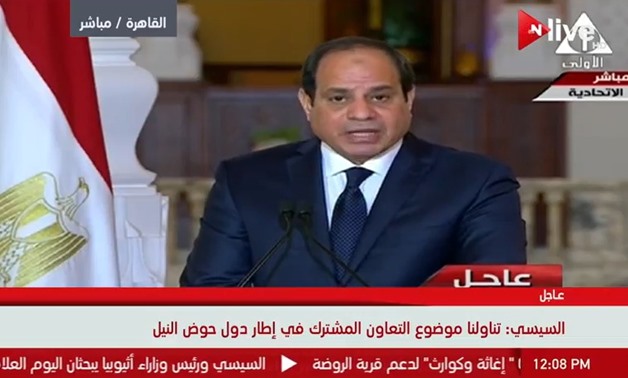
TV Screenshot of President Abdel Fatah al-Sisi's speech at a joint press conference Thursday, January 18, 2018.
CAIRO – 18 January 2018: President Abdel Fatah al-Sisi stressed that Egypt, Ethiopia and Sudan need to work rapidly to overcome current stalemate over GERD’s technical studies, during a Thursday joint press conference with the Ethiopian Prime Minister Hailemariam Desalegn.
Sisi highlighted at a Q and A session at the end of the conference that the required technical studies were set as a condition to determine the dam’s operation mechanism before the reservoir start filling, according to the Declaration of Principles signed in 2015 between the three states.
He explained that Egypt has never had any problem with development steps in the Nile Basin states as long as they do not harm Egypt’s interests.
He further said that this summit held between Egypt and Ethiopia assures that both states have political will and determination to overcome any obstacles standing in front of their relations, Sisi added.
“We appreciate Ethiopia’s insistence on not harming Egypt’s water interests, but it is essential that the only way to accomplish this is to complete the required studies and to adhere to its results in order to avoid any adverse effects on the two downstream countries,” Sisi added.
During the conference, President Sisi reiterated Egypt’s previous suggestion to tap in the World Bank as a mediator in the tripartite technical negotiations of the Renaissance Dam impacts.
On January 8, Egypt’s Foreign Minister Sameh Shoukry stated that Egypt has not received any official responses from either Sudan or Ethiopia to its suggestion.
Considered as a move to re-build mutual trust, Shoukry headed to the Ethiopian capital, Addis Ababa, last December with new suggestions regarding the dam to break the tensions between the three countries.
On November 12, the last meeting of the Tripartite National Committee on the Renaissance Dam (TNCRD), which was hosted in Cairo, concluded without reaching an agreement regarding the guidelines suggested by a study on the dam’s potential effects on the Nile Basin states, according to Minister of Irrigation and Water Resources Mohamed Abdel Ati.
A report based on the study presents guidelines by which Ethiopia can fill its reservoir without harming the water flow into Egypt and Sudan. The $4 billion dam is being constructed on the Blue Nile with a capacity of 74 billion cubic meters and is expected to generate up to 6,000 megawatts of power.
Since May 2011, Cairo has voiced its concern over how the dam can reduce the country’s annual share of more than 56 billion cubic meters of Nile water. Egypt’s average water per-capita is expected to drop from 663 cubic meters per year to 582 cubic meters by 2025, according to the Central Agency for Public Mobilization and Statistics (CAPMAS). However, Addis Ababa claimed that the dam is necessary for Ethiopia’s development and will not harm downstream countries.

Comments
Leave a Comment